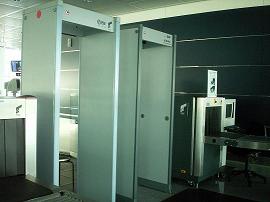Domestic ID advice to hit e-ticketing?

A parliamentary committee has recommended that passengers be required to show photo identification to government officials to prove their identity in order to board domestic flights, a move that could undo e-ticketing efficiencies set up by domestic airliners.

(Seguridad by Daniel Lobo, CC2.0)
The parliamentary joint committee on law enforcement launched an inquiry into the adequacy of aviation and maritime security measures in September 2009 as part of its duties under the Australian Crime Commission Act 2002. It noted that there is currently no legal requirement for domestic air passengers to show photo identification in order to travel, opening a door for drug traffickers who could travel using tickets booked in different names.
The committee was concerned that moves by airlines towards e-ticketing introduce further vulnerabilities and allows organised criminal networks to exploit the system. It recommended that passengers be made to provide photo identification, or in the cases where they were unable to do so, sign a statutory declaration.
While the Australian Service Union and Western Australia Police senior research coordinator, Maggie Plumb, who consulted in a private capacity, advocated that passengers should identify themselves at check-in, the committee's recommendation was that the verification process occur at the gate by a government official.
However, Qantas' head of security and facilitation, Stephen Jackson, told the committee that an ID requirement would affect airlines' ability to use electronic check-in services. He said that the cost of implementing a system to perform identity checks would be in the order of millions of dollars.
While at-the-gate verification would seem not to affect the use of self-print or mobile-based e-ticketing systems that currently allow passengers to bypass the check-in lobby, it would introduce an additional step in the boarding process.
The joint committee also recommended that further investment be placed in CCTV cameras so they can provide footage of "evidential quality".
During the inquiry, Australian Federal Police Association (AFPA) president, Jonathan Hunt-Shaman, said, "there is no point in having them if they cannot even do that", providing an example of an incident at Sydney domestic airport involving motorcycle gang violence where police had to rely on privately owned footage.
AFPA estimated the total cost to upgrade the 11 airports in consideration to the required quality would be $20 million.
The full report is available online.